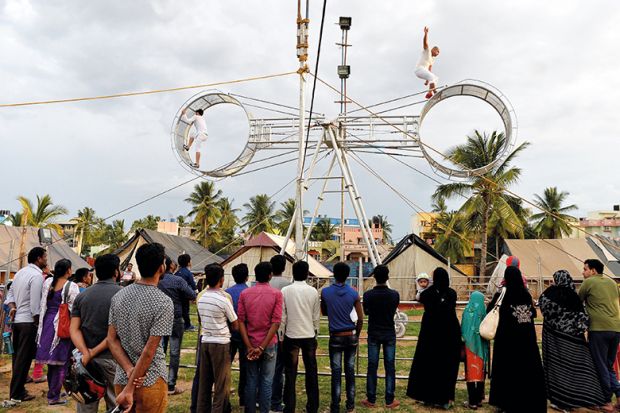Browse the Latin America University Rankings 2022 results
Before the pandemic, Latin America was showing signs of growth in university diversification, with enrolment rates above the global average. This growth was mostly absorbed by the private sector, without proper public funding, and it was one of the regions with lower international academic mobility rates, comprising only 3.5 per cent of world mobility.
It is also a region with deep structural inequalities and inherent differences between countries, as well as a stalling economic growth that dates back to the early 2000s.
Until 2019, the technological gap had remained unaddressed, with substandard technological skills among the population and uneven funding among countries. Research was likewise affected: despite a significant growth in publications in high-impact journals between 2010 and 2019, only 40 per cent of researchers held a doctoral degree.
Some already noticeable effects
It is not yet possible to assert with certainty whether the pandemic increased or decreased enrolment rates for higher education in the region. In some areas, the mass admission of students who seized the opportunity of online education resulted in a rise in student numbers. Yet in other more disadvantaged areas, many students failed to continue with their studies owing to difficulties accessing online courses.
The region’s universities confronted the pandemic and became key players in supporting governments in the implementation of epidemiological containment measures. And, while they carried on with their distance education schemes, exhibiting efficient management skills and the reallocation of internal funding, it was students, teachers and institutions alike who – to a greater extent than the governments – bore the brunt of this effort. Only those institutions with quality technological resources, proper online connectivity and competent staff with digital skills could, during lockdown, offer a rapid response, scheduling remote classes and keeping their quality standards intact.
Internationalisation during the pandemic was focused on virtual mobility and global cooperation networks were strengthened. A challenge lies ahead in ensuring equity in internationalisation, so that these experiences are not fragmented into physical mobility for wealthier sectors and virtual mobility for the rest. We must think of internationalisation as a hybrid format, incorporating it into the curricula and into university life, and not merely restricting it to mobility.
The university of the future
The major challenge of higher education in the region will be that of prioritising educational funding for bridging the gaps and inequalities brought about by the pandemic, which add to existing structural inequalities.
Looking towards the future, in a context of a population that is demographically ageing, now is the time to reformulate university programmes. Universities should understand that it is pedagogy, and not technology, that makes virtual education successful.
Another challenge is to rethink and diversify quality assurance mechanisms for external bodies to certify both traditional and e-learning programmes, facilitating a much-needed flexibility and a wider variety of offers for different groups. In other words, enabling quality and innovation at an equal rate.
Finally, the pandemic led many university actors to rethink management processes that had been idly in place for years. The critical context fostered democratic processes in decision-making, new forms of institutional communication, and a call to other actors for joint dialogue and planning. In terms of good practices for work in times of crisis, there have been positive results: file digitisation, crisis management boards and the review of formerly bureaucratised processes, which have been made flexible. It is likely that, in the post-pandemic context, many of these changes will remain in place for quality improvement in management and institutional governance of higher education in Latin America.
Mónica Marquina is a researcher in higher education at CONICET in Argentina. The study Diagnóstico sobre la educación superior y ciencia post covid-19 en Iberoamérica: Perspectivas y desafíos de futuro, 2022 was carried out by a research team led by Mónica Marquina, with the collaboration of Cristian Pérez Centeno, Marisa Álvarez, Pablo García, and Norberto Fernández Lamarra.
Register to continue
Why register?
- Registration is free and only takes a moment
- Once registered, you can read 3 articles a month
- Sign up for our newsletter
Subscribe
Or subscribe for unlimited access to:
- Unlimited access to news, views, insights & reviews
- Digital editions
- Digital access to THE’s university and college rankings analysis
Already registered or a current subscriber? Login



